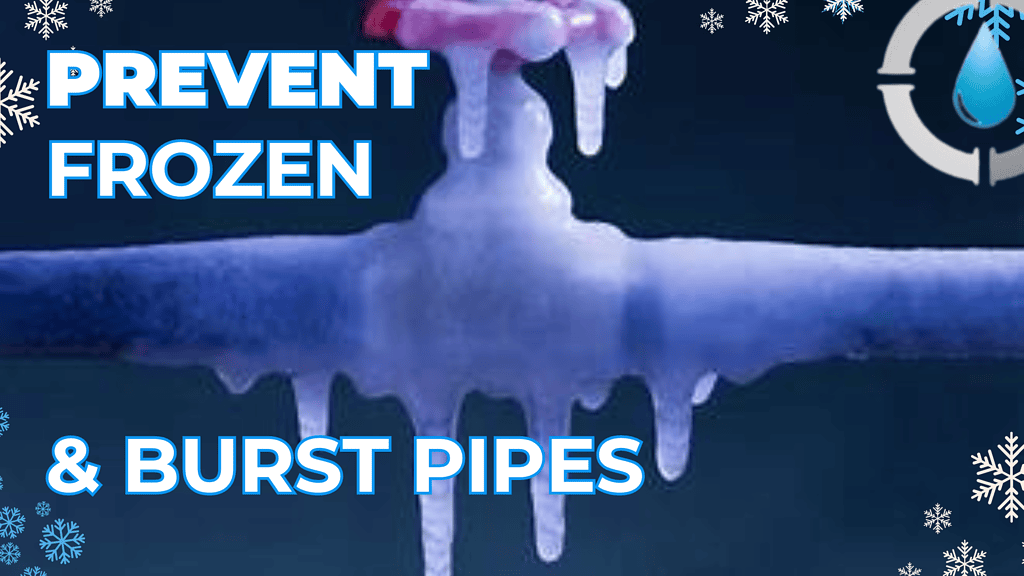
Winter weather in North Texas can catch many homeowners off guard, especially when temperatures suddenly dip below freezing. While our region may not experience the prolonged cold of northern states, the occasional freeze can still wreak havoc on your plumbing system. Frozen pipes are a common wintertime issue that can lead to serious water damage and costly repairs if they burst. This guide will help you understand how to prevent frozen pipes and what to do if you encounter one.
Why Do Pipes Freeze and Burst?
Pipes freeze when the water inside them drops to 32°F (0°C) or lower, turning the water into ice. As water freezes, it expands, creating pressure within the pipe. This pressure can cause the pipe to crack or burst, often leading to significant water damage.
Preventing Frozen Pipes: Essential Steps for North Texas Homes
Given the construction of homes in North Texas, where pipes are often placed near exterior walls or at shallow depths, it’s important to take preventative measures to protect your plumbing system during the winter months:
1. Insulate Your Pipes: How to Prevent Frozen Pipes in North Texas
One of the most effective ways to prevent frozen pipes is through proper insulation.Pipes located in unheated areas like attics, crawl spaces, garages, and those near exterior walls are particularly vulnerable to freezing. Insulate these pipes with foam sleeves, heat tape, or other suitable materials to keep them warm. In North Texas, where pipes aren’t buried as deep as in colder regions, this step is especially critical.
2. Maintain a Consistent Indoor Temperature
Keep your thermostat set to at least 55°F (13°C), even when you’re away from home. This helps prevent your pipes from freezing, especially those located in walls adjacent to the outside, where temperatures can drop quickly.
3. Allow Faucets to Drip
During particularly cold nights, allowing your faucets to drip slightly can prevent freezing by keeping water moving through the pipes. This is especially important for faucets connected to exterior walls or exposed pipes.
4. Disconnect and Drain Outdoor Hoses
Disconnect and drain outdoor hoses, then install faucet covers to add an extra layer of protection. This step prevents water trapped in hoses or faucets from freezing and expanding, which could cause significant damage to your pipes.
5. Seal Cracks and Openings
Inspect your home for any gaps or cracks where cold air could reach your pipes. Pay attention to areas around windows, doors, and foundations. Sealing these openings with caulk or insulation can help maintain a warmer temperature inside your walls, protecting your plumbing system.
6. Know Where Your Shut-Off Valves Are
In case of an emergency, it’s crucial to know where your main water shut-off valve is located. This will allow you to quickly stop the flow of water if a pipe bursts, minimizing damage to your home.
What to Do If Your Pipes Freeze
If you suspect your pipes have frozen, it’s important to act quickly:
- Turn Off the Water Supply: Immediately shut off the main water supply to prevent further damage if the pipe bursts.
- Thaw the Pipes Safely: Use a hairdryer, space heater, or heat lamp to gradually thaw the frozen pipe. Start close to the faucet and move towards the blockage. Never use an open flame, as this can damage the pipe or cause a fire.
- Check for Leaks: Once the pipe has thawed, check for any signs of leaks or bursts. If you find any damage, keep the water supply turned off and call a professional plumber immediately.
Urgent Steps to Take If a Pipe Bursts
A burst pipe can cause significant damage in a very short time. Knowing exactly what to do in this situation is critical to minimizing the impact:
- Shut Off the Main Water Supply Immediately
- The first and most crucial step is to turn off the main water supply to your home. This valve is usually located near the water meter, which may be in a box near the street, in an alley, or where the main line enters your home. Shutting off the water will stop the flow and prevent further flooding.
- Open All Faucets to Relieve Pressure
- After turning off the water supply, open all faucets in your home to relieve any remaining pressure in the pipes. This will also allow any trapped water to drain out, reducing the risk of additional leaks.
- Turn Off the Electricity in Affected Areas
- If there is standing water or if the burst pipe has caused flooding, it’s vital to turn off the electricity in the affected areas of your home. Water and electricity are a dangerous combination, and this step will help prevent electrical hazards.
- Call GPS Plumbing Immediately
- Contact GPS Plumbing as soon as possible to address the burst pipe. Our professional plumbers can assess the damage, repair the burst pipe, and help mitigate any further damage to your home. Quick action is key to minimizing repair costs and preventing additional issues.
- Document the Damage for Insurance Claims
- Take photos and document any damage caused by the burst pipe. This documentation will be helpful if you need to file an insurance claim for repairs and restoration.
Why Choose GPS Plumbing?
At GPS Plumbing, we understand the unique challenges that North Texas homeowners face during the winter months. Our expert team is equipped to handle everything from insulating your pipes to emergency repairs for frozen or burst pipes. We are committed to providing reliable, high-quality service to keep your home safe and your plumbing system in top condition.
Need Help Protecting Your Pipes? If you’re concerned about your pipes freezing this winter, or if you’re dealing with a plumbing emergency, contact GPS Plumbing today. Our team is ready to help you protect your home and keep your plumbing system running smoothly all winter long.
Learn more about how to avoid frozen pipes and costly water damage from the Texas Department of Insurance here. Frozen pipes can cause significant damage to your plumbing system if not properly handled. Learn how to prevent and repair this common winter problem in our comprehensive guide on how to prevent and fix frozen pipes and keep your home protected during the colder months. Prepare your home for the cooler months ahead with these essential fall plumbing maintenance tips for North Texas to keep your plumbing system running smoothly all season long.

